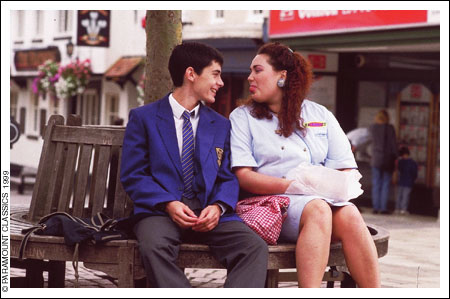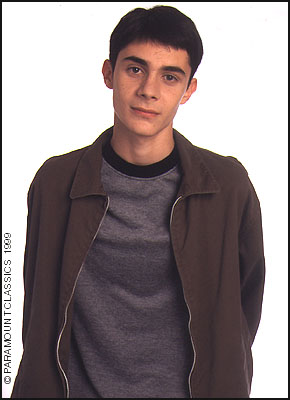


Whether you swooned for him as Taplow in The Browning Version, or gaped at him as the young Humbert Humbert in Lolita, or are just making his acquaintance as Steven Carter in Get Real, you have have certainly taken our On-Line Reviewr's advice to heart and have started asking for more information on England's hottest "new" star, Ben Silverstone.
Unfortunately, OUR website's review of Get Real has come up as one of the two leading sources of information on Ben, so we have precious few places to seek for more information! Hence, Ben has a "micro-page" with us. Doubtless he will have many, many, many full-fledged fan pages spring up in the months to come, but until that happens, we are responding to your demands for "MORE, MORE, MORE!"


The following information was lifted bodily from the Paramount Classics Pictures Official Web Site for Get Real:
"Ben Silverstone was just 13 years old and had no acting experience when Mike Figgis cast him in the major role of Taplow in The Browning Version. He went on to play the young Humbert Humbert in Adrian Lyne's controversial screen adaptation of Lolita and now in GET REAL he plays Steven Carter, a 16 year old faced with the dilemma of coming out before coming of age.
"Ben filmed GET REAL after graduating from St. Paul's School in London. He is now reading English at Trinity College, Cambridge, where he began his degree course in October 1998."
Jaundiced Eye translation into American: "Ben's a college freshman majoring in English at one of the most prestigious colleges in England."
Jaundiced Eye note about "coming out before coming of age:" in January, 1999, the British House of Commons voted to amend the law to allow teenagers to legally have sex with each other, regardless of their preferences or orientations. Previously, only heteroteens could legally make out at age 16. The British House of Lords promptly voted to stop the law change, and it is still illegal for Gay English teens to do with each other what they MAY do legally with members of the opposite sex. The U.K. is one of the few countries left in Europe with such an archaic double-standard, and the House of Lords (a relic of the days when Bishops and Barons had larger private armies than the King) will likely have their "preogatives" strongly curtailed by the Government over the course of the next year. Tony Blair and the British people aren't likely to continue tolerating for long having people like "Lady" Marget Thatcher (friend of former Chilean Facsist dictator Agustin Pinochet) voting -- for life -- against the decisions of the House of Commons, whose members are directly elected by the people.


King Lear Tuesday 10 to Saturday 14 November, 7.30pm, Queens’ Fitzpatrick Hall
This week Lear meets The Krays at Queens. Well, not quite. I thought that one up before I went to see the play, anticipating that it would work rather less well than it did. According to the directors’ notes, the aim of setting Lear in the East End of the 1960s is of translating "the action to a context relevant to those viewing." The transposition has mixed results: on the one hand we see a convincingly seamy setting; characters in monochrome sharp suits, on the other we hear well-spoken voices talking about hunting, addressing each other as aristocrats. When was the last time you heard someone from the East End talking about going hunting? I take issue with the directors’ assertion that the play "isn’t about kings, or invasions, or renaissance society." By choosing to focus on the ‘timeless’ theme of domestic tragedy ("It is a play about people…" - tell us something new!), this production risks losing a major source of its dramatic energy – the tension of the small family world, stretched out over the macrocosm of the nation. This results in moments when the rhetoric of royalty and dominion poke through with glaring incongruity.
This thematic gripe aside, there are some fine individual performances: Alex Madden as Cordelia stood apart from the otherwise uninspired female characters. Ben Silverstone as Edmund succeeded in establishing a real conspiratorial rapport with his audience. Richard Thomas (Kent) and John Finnemore (Fool) were excellent – go to this play if only to see his hilariously pathetic attempts to hold a broken umbrella over Lear raving in the storm.

